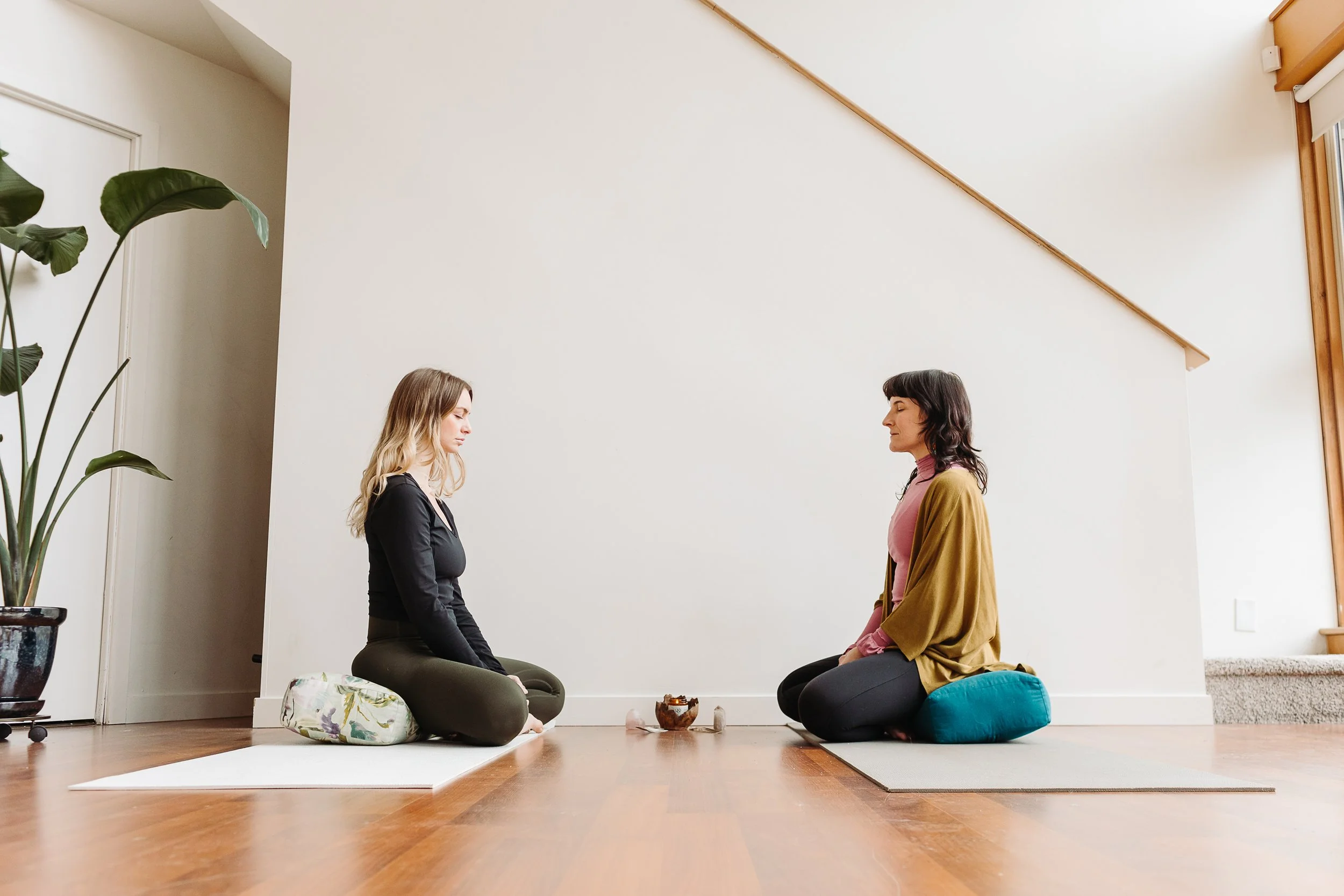How to Calm the F*&% Down
In a world that treats our bodies and minds like machines, where how hard you hustle appears to have a direct correlation to your worthiness to even exist, where rest is viewed as a tool to make us more productive, where dings, pings, and all sorts of notifications keep us perpetually engaged and on alert, it’s not hard to understand why so many of us are walking around balled up in states of anxiety.
We aren’t exercising enough, at home enough, creating enough, connecting enough, sleeping enough, getting it ‘right’ enough. We are in a constant spiral of catch up and disappointment.
We need to calm the f*$% down, and fast!
And there’s that sense of urgency again. We want a quick fix to get out of this spinning anxiety, but there is no quick fix. Let’s repeat that. THERE IS NO QUICK FIX. It’s taken a long time to accumulate this tension inside ourselves and it’s going to take conscious, connected effort to consistently regulate ourselves again and quell our anxiety.
There’s a few things to remember when wanting to calm down.
One: You are not the only one.
No matter what’s going on inside your head, the story you’re spinning, the rapid fire thoughts, the fear, they are not unique to you. If you feel lonely with your anxiety, remember there are others who have gone before you and found a way through.
Two: You are not “going crazy”.
First of all, this line of thinking is problematic. Let’s start from a place of compassion. Your body is incredibly complex and capable of astonishing abilities including producing overwhelming thoughts that make your heart race and leave you feeling out of control. This is actually part of a survival strategy so let’s just be kind to ourselves about it.
Three: It’s not all your fault.
See paragraph one for all the ways society has set us up to experience anxiety.
Four: You can change your brain.
With consistency and practice you can begin to unwind and mitigate your anxiety. Keep reading for the best practices to help you.
Let’s look at the most important pieces to help you calm the f*&% down.
Move your body to move your mind.
Maintaining a regular movement practice is an incredible (and free) stress reduction treatment. It doesn’t have to be a vigorous run to help you feel more at ease though. Moving in ways that feel good to you and help you tune into your body and your environment is a powerful and effective way to downshift your anxiety. Take a walk, do some gardening, practice yoga or pilates, whatever floats your boat! If taking time out for a movement session isn’t available in the moment, try shaking out your hands and arms, wiggle your shoulders, stamp your feet and rumble your lips. These little acts will help dispel tension right away.
Embrace mindfulness and breathing practices.
Just like movement, having a regular relaxation technique that you tune into can help keep anxiety at bay. The best practice is the one that helps you, so try a few things out to connect with the tools that feel the most accessible to support your relaxation. Our number one quick tool for in the moment of an anxiety spiral is to focus on elongating the exhalation of your breath. It promotes the relaxation response of your nervous system and is a powerful tool to re-establish calm.
Reduce stimulants.
Coffee, caffeinated beverages, nicotine, these all amp your insides and can aggravate anxiety. Cut them out or reduce your intake.
Put the good stuff in.
Keeping your gut’s microbiome healthy has an impact on brain function and mood. Lean towards eating a health-filled diet most of the time. Add in probiotics and prebiotics. Avoid alcohol, packaged foods and refined sugars (more on all of this in an upcoming post). You know all this, and if you want to feel better, you’ve got to embrace it!
Put sleep on the top of your to-do list.
Sleep is when we recover and heal. If it isn’t a priority for you (ie. you don’t have bedtime and wake-up rituals and you sleep less than 7-8 hours a night), it’s time to make it one. To learn more about supporting your sleep, head here.
Get to know your anxiety.
This may involve your healthcare provider, a therapist or counselor, your family and friends, or some scheduled journaling time. Start to learn more about how your anxiety shows up, what triggers anxious episodes, and what treatment plans might be appropriate for you.
Stick to the plan.
Consistency makes a huge difference for anxiety. Whether it’s taking your medications as directed, sticking to your movement plan, maintaining your sleep schedule, staying sober, whatever the plan is for you, stay the course. Perseverance in your healthy goals will help manage and reduce your anxiety. If you need help sticking to the plan, that’s what we do at Radiant Effect. Reach out to talk about options.
Alleviate your triggers.
Alerts on your phone, scrolling social media, social gatherings, finances, messiness at home, these things can all contribute to anxiety. Though we can’t always remove these triggers completely, we can set ourselves up for more success. We have such a hard time making these choices for ourselves, even though we know it will make us feel better. Try picking one of these things right now! Yes, right this very moment. Turn off your alerts on your phone, delete people you follow that don’t make you feel good, set a limit on how long you’re scrolling, make a plan for navigating social settings, ask for help with organizing your money, tidy just one thing a day and reward yourself for it (a whole Marie Kondo is likely unrealistic).
Anchor in on your supports.
It’s tempting to hide out when you have anxiety. Worries can consume you and make you feel frozen and isolated. Make a list of your closest circle. These are the people to reach for when you’re in the thick of it. Make a list of the people you like spending time with that might not be in the inner circle. These are the people to cultivate deeper friendships with and let them know you sometimes struggle with anxiety. Eeek! Vulnerability! Sounds hard right? More often than not though, when we open up we find others feel the same way, or have navigated it before. And truly, the more support we have, the better.
If your anxiety has become debilitating or all consuming, it’s time to reach out for help. See your healthcare provider or mental health practitioner and let them know what’s going on. There are so many powerful ways to treat anxiety and seeking professional help may be part of the conversation. If you need more guidance on this, reach out. We’re always happy to help.
Finally, we’d love to share this affirmation that’s been supporting us along the way. We hope it serves you too!
My body is always going in the direction of optimal health. I am vibrantly, radiantly, optimally healthy. I am at home in my body. It is safe for me to relax and to be at peace right here, right now.



